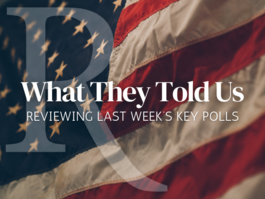We Need Fallacy Control Now! By Michelle Malkin
Enough is enough. It's epidemic. It's dangerous. And the time has come to demand its end.

Enough is enough. It's epidemic. It's dangerous. And the time has come to demand its end.

Voters aren't overwhelmed with their own representatives to Congress but are more supportive of them than they have been in years.

The hurricane devastation is severe. What should the federal government do?

Is there no third rail of American politics this president fears? Obviously not.

Congress is working on a proposal that would be the most dramatic overhaul of the U.S. tax code in decades. But most voters don’t think it will happen, and a sizable number believe that’s because of Democrats in Congress.

Much as he did in his command performance before the United Nations, when he took back control of U.S. foreign policy, President Donald Trump has seized and energized the tax cut issue. Almost daily, he is pounding away on the themes of faster economic growth and more take-home pay, arguing that his plan will make America's economy great again.

The NCAA has been rocked by a “pay to play” bribery scandal involving big-time college basketball teams that led to the suspension of Louisville’s head coach last week and an FBI investigation.

"An act of pure evil," said President Trump of the atrocity in Las Vegas, invoking our ancient faith: "Scripture teaches us the Lord is close to the brokenhearted and saves those who are crushed in spirit."

Twenty-nine percent (29%) of Likely U.S. Voters now think the country is heading in the right direction, according to a new Rasmussen Reports national telephone and online survey for the week ending September 28.

Most voters agree that they’re overtaxed but don’t expect a tax cut even if Congress approves the big changes in the tax code proposed by President Trump.

Voters strongly believe politicians at all levels of government can be swayed with cash but say local elected officials can be bought for a lot less than those higher up.

The United States military and an army of first responder volunteers are working to resupply and stabilize Puerto Rico after the hurricane devastation of the U.S. island territory.

When tracking President Trump’s job approval on a daily basis, people sometimes get so caught up in the day-to-day fluctuations that they miss the bigger picture.

Next week, the Supreme Court will hear oral argument in Gill v. Whitford, a case challenging Wisconsin's legislative district lines as an unconstitutional Republican gerrymander. It's attracted attention because many high-minded commentators have blamed partisan gerrymandering for today's highly polarized politics -- and for the fact that Republicans have won majorities in 67 of the 98 houses of state legislatures and in 10 of the past 12 elections in the U.S. House of Representatives.

Most Americans continue to say their families regularly display the U.S. flag on holidays, and even more label themselves as patriotic Americans.

"A just law is a man-made code that squares with the moral law, or the law of God. An unjust law is a code that is out of harmony with the moral law. To put it in the terms of St. Thomas Aquinas, an unjust law is a human law that is not rooted in eternal and natural law."

Voters still see a lot more corruption in the federal government than in its state and local counterparts, but there’s doubt about government honesty at every level.

Voters remain strongly convinced that their fellow countrymen go to the polls without being fully aware of what is at stake.

The dominant theme in next year’s Senate elections is the confluence of two competing forces: The huge number of seats the Democrats are defending versus the usual boost that the non-presidential party, in this case the Democrats, enjoys in midterm elections.

In today’s digital age, it’s no surprise kids spend so much time in front of a screen.